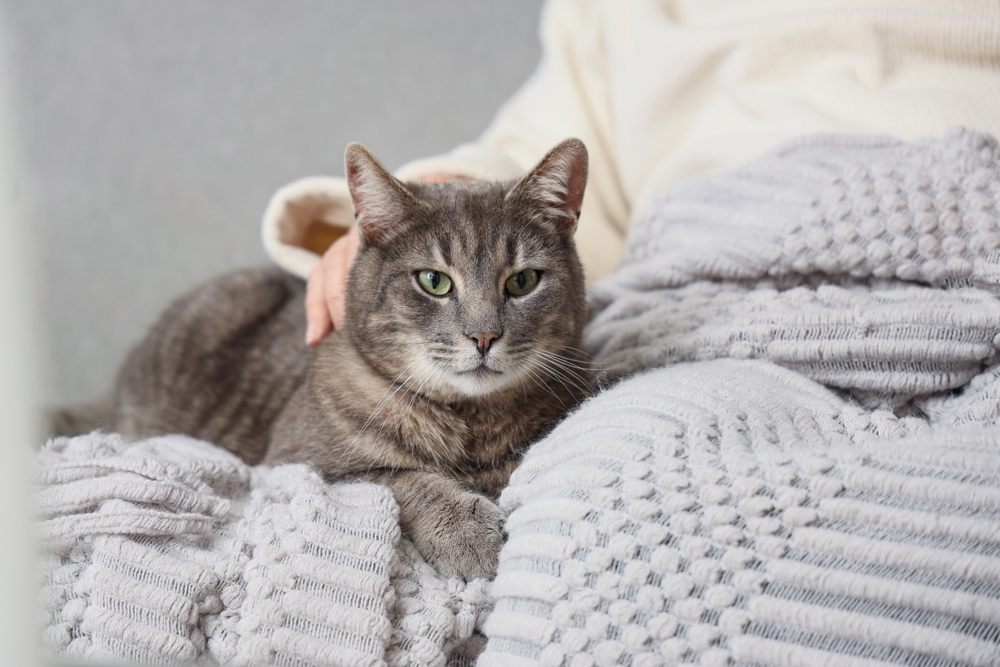Senior Cats: What to Expect at 10–12 Years
Updated on October 08, 2024

It happens to all cats eventually. Your cuddly kitten is now officially entering her senior years. That does not mean that she does not have many healthy and happy years left to enjoy with you. It only signals that now you will need to become your cat’s advocate to help ensure she enjoys her golden years. You will need to learn more about the signs of changes in her health, and when to seek the advice of your veterinarian.
All featured products are chosen at the discretion of the Vetstreet editorial team and do not reflect a direct endorsement by the author. However, Vetstreet may make a small affiliate commission if you click through and make a purchase.
Physical and Mental Development
While still your purring buddy, you will notice that your cat is getting a bit slower. She might not decide to climb the cat condo quite as often or leap from that high bookshelf onto the couch. Mentally, she’s still sharp, but at this age it may take her longer to adjust to changes in her routine or environment. In fact, she may not handle any stress well, and even act fearful of anything new or different.
While these may just be indications of getting older, don’t assume that every change is part of the aging process. You should always discuss any alterations in your cat’s physical condition or behavior with your veterinarian. Signs of disease, conditions or illness can be subtle, and your observations may be the first indication of a problem. Early diagnosis and treatment is the key to providing the highest quality of life for your cat.
Behavior Changes
Don’t be surprised if your aging, fuzzy feline begins to take a bit longer to come and investigate when you get home from work. She may become more vocal or develop more anxieties about change, strange people or new noises.
She may show less interest in play, although she’s still willing to participate occasionally, and she is more likely to indulge in longer catnaps. Even so, continue to give her many opportunities for stimulating play and exercise. This will help to keep her mind and body healthy.
Health and Nutrition
Just like dogs, adult cats are at high risk for obesity, but many older cats start to lose weight as they get further into their senior years. Your veterinarian will be able to give you advice on your cat’s changing dietary needs.
Your cat should visit the veterinarian twice a year now to keep a close eye on her health and to start monitoring her for many of the common diseases that affect older cats, such as arthritis, hyperthyroidism and renal disease, to name a few. Many of these conditions can be successfully managed if diagnosed early.
Your veterinarian will want to know about any behavioral changes you’ve noticed. Her new behaviors can give important clues as to her health status. If she suddenly doesn’t want to jump up onto the top of the bookcase, she may have arthritis or another painful condition. By mentioning this small behavioral change, your veterinarian will know where to look for a problem and will be able to make her feel a whole lot better.
Kidney problems and lower urinary tract disease can also emerge at this age. So, if your cat is now having accidents around the house, even occasionally, alert your veterinarian.
Older cats are also at increased risk for diabetes. What you may see is an increase in her thirst or a much wetter litterbox. So, take note if you have to fill her water bowl more or if you find that the litter has to be changed often.
Cataracts and other eye conditions also become more likely as she gets older.
As if that wasn’t enough, your cute kitty is also at increased risk for many dental problems, including bad teeth or bleeding gums that can result in even more serious medical problems if left untreated.
Your veterinarian will examine her mouth closely as signs of other serious systemic illnesses can be found there. You should take time to observe any changes in her eating behavior—whether she’s eating more or less—and alert your veterinarian if you observe changes in these patterns.
The Importance of Cat Health Insurance
Your cat health insurance policy can help to offset unexpected treatment costs. These costs may include veterinary visits, prescription medications, or procedures such as imaging or surgery.
Find a personalized plan for your cat by using the insurance finder below:
Training Tips
At this age, it is important to have realistic expectations. This is not the time in her life to teach new tricks or new rules. It is, however, important to reinforce desired behaviors. You can do this by not only rewarding behavior you like, but by making misbehavior unattractive.
For example, perhaps your cat has taken a liking to a new piece of furniture as the perfect scratching post. It won’t cross her mind that you don’t agree, so it’s your job to make the piece of furniture as unattractive as possible.
You will have to figure out what turns your cat off. Cats generally hate getting their claws caught when they scratch, so draping twill or netting over the new furniture initially might discourage the behavior. Just watch her to make sure her toes don’t get caught, which could lead to injury. Other cats hate the smell of citrus, which may serve as a useful deterrent. She will soon discover that the scratching post really is much more fun than your new couch.
Sit back and relax. Your cat is a lovely, purring queen of the castle. Stay on top of her developing health needs and look forward to many more years of enjoying her company.



